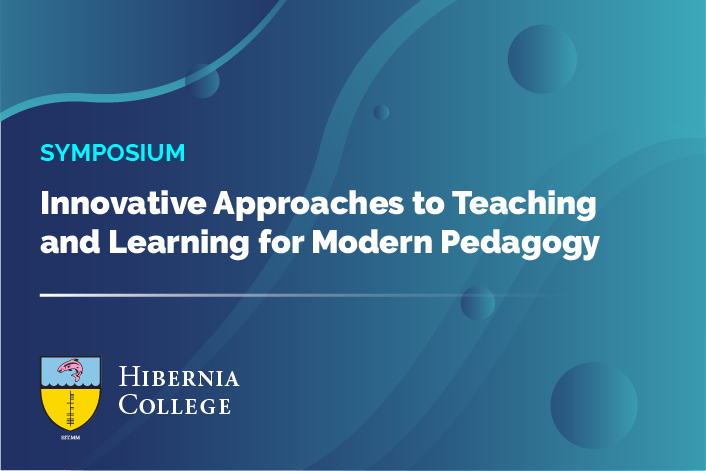
Hibernia College’s School of Education hosted an inaugural online symposium — ‘Innovative Approaches to Teaching and Learning for Modern Pedagogy’ — on 10 February from 4:30-6:30 p.m. The symposium provided adjunct faculty and other colleagues with an opportunity for professional development and the chance to foster future research collaboration.
Educators discussed, analysed and reviewed innovations in teaching practice, support and assessment. The symposium, moderated by Elva Casey, Acting Programme Director of the PME in Primary Education programme, focused on supporting student teacher wellbeing, sharing experiences in adapted online environments and progressing standards in teacher education and assessment.
Incoming Academic Dean Dr Mary Kelly welcomed those in attendance, highlighting the important role of online meeting technology in permitting such a sizable group to meet with ease. The symposium progressed through presentations on topics integral to Hibernia College’s approach to teaching and learning. The first presentations explored Universal Design for Learning (UDL) in creating innovative and inclusive learning experiences. The following presentations dove into wellbeing and fostering relationships in physical and virtual teaching and learning spaces.
Universal Design for Learning (UDL)
Dr Carol-Ann O’Síoráin, Lecturer in Education, encouraged participants to implement UDL as an educational framework for thinking, acting and planning inclusively. She outlined the principles of UDL, including a deeper understanding of representation, engagement and action and expression. Participants engaged in breakout sessions to discuss how to support student teachers in using UDL as a foundation for their teaching. Dr O’Síoráin closed the session by emphasising the importance of the methodologies espoused in the curriculum for promoting UDL and of focusing on skills building.
Applying UDL in Remote Classrooms
Justin Staunton, Learning Technologist in the Digital Learning Department, and Dr John Meegan, Lecturer in Education on the PME in Primary Education programme, discussed leveraging innovative digital technologies in higher education to support inclusive practices. They guided participants in using Wooclap to support the three UDL principles of engagement, representation, and action and expression.
Wooclap is a digital platform providing various activities and ways of interacting to presentations and online or face-to-face lectures. The presenters shared practical ways to use the tool to spark excitement and curiosity for learning, to communicate through languages that create a shared understanding and to give students tools to help them express and communicate their ideas.
Wellbeing and the Student Experience
Dr Niamh O’Brien, Lecturer in Education, began her presentation by underscoring the College’s aim to foster wellbeing among student teachers to enable them to fulfil their potential as teachers in their careers. Teachers who understand wellbeing will then promote wellbeing in their schools and protect the wellbeing of their students. She described wellbeing as a balance between life’s challenges and resources of resilience. Her presentation walked participants through her research and shared theory and resources to promote wellbeing in teaching and learning.
Fostering Student Relationships in School Spaces
Dr Barry O’Leary, Lecturer in Education in the PME in Primary Education programme, outlined how spaces and places can support students in both a physical school setting and a blended learning environment. Student wellbeing is influenced by social relationships that are structured and influenced by the school setting. Dr O’Leary encouraged educators and teachers to reflect on their role in how these relationships are fostered and managed in a school setting.
Collaboration in Virtual Spaces
Francis McKeagney, Head of Digital Learning, explained the College’s reasoning in moving to a collaboration platform and outlined how the new Cohort app is helping students and staff work more closely together. As a blended learning institution, technology is an integral part of our offering. Our role is to support pedagogy that enriches the teaching and learning experience of the students. Francis shared that, with Cohort, we now have the stable context of a virtual space for sustained conversations and explorations.
This first symposium was well attended with high engagement from participants. It was organised around the central theme of innovation in pedagogy as outlined by the Organisation for Economic Co-operation and Development (OECD) (2018): ‘Innovation in pedagogy, like any kind of innovation, takes existing ideas, tools or practices and brings them together in new ways to solve problems when current practice is not adequately meeting needs.’ The School of Education plans to schedule a second seminar in the near future with a focus on innovations in assessment.